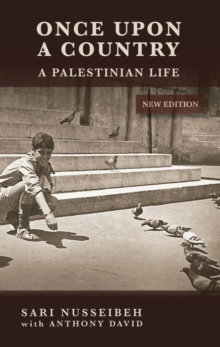As a child growing up in East Jerusalem, the world puzzled Sari Nusseibeh: the prosaic co-existed too closely with the mythical and sacred whilst the political world seemed to him ever-changing and incomprehensible.
The young Nusseibeh revelled in the citys rich past.
He played in the streets of his beloved Old City which were steeped not only in the histories of the three great religions but also in his familys history: for the Nusseibehs had lived here for thirteen centuries serving as judges, teachers, Sufi sages, politicians and, most extraordinary of all, as doorkeeper to the Church of the Holy Sepulchre.
It is perhaps this intimate knowledge of the interconnections between the three religions which led to an open-mindedness in Nusseibeh rarely seen in, let alone expressed by, any protagonist in the Palestine-Israel conflict.
Like most Palestinians, his family suffered the upheavals and displacements if not the economic consequences of the first Arab-Israeli war of 1948, which we witness through his fathers active participation in defining, and infinitely disputed, moments in the Palestine-Israel conflict.
Simultaneously a pan-Arab idealist and healthy sceptic, his father became a legendary figure who never succumbed to nationalist ideology or rhetoric.
A philosopher by training and profession, Nusseibehs political activism developed after his education at Oxford and Harvard, and was both gradual and reluctant.
A firm and idealistic believer in the possibility of a one-state solution where Jews and Arabs could co-exist in dignity, he was forced to re-assess these ideas as the Israeli occupation affected Palestinian life irrevocably.
While teaching at Birzeit University in the West Bank, he was appointed head of the union, which soon brought him into direct confrontation not only with Israeli military law in the West Bank, but also with the PLO leadership.
From then on Nusseibeh realized the power of civil disobedience and developed this into a strategic political tool, coupled with his innate respect for personal freedom and his ability to think rationally.
Not afraid to criticize either the Israelis or the Palestinians, he has managed to receive death threats from extremists on both sides and has even been termed the smiling face of Palestinian terror by some Israelis.
Appointed by Arafat as the PLO representative in Jerusalem in 2001, Nusseibehs relationship with him had long been tenuous and reserved.
Always aware of Arafats achievements, he nevertheless remained highly critical of many aspects of his leadership as well as of the second intifada.
Nusseibehs unflinching opinions are a fascinating and rare insiders view into the workings of the first Palestinian Authority.
Sari Nusseibeh sees himself on a double mission. He is fighting the Israeli occupation from eradicating the Arab civilization he loves from his native Jerusalem. And at the same time, building the Palestinian institutions necessary to achieve peace, while battling the corruption of Palestinian politics and the extremism of political Islam.
Seen by some as a local Don Quixote, his vision of a healthy, democratic society based on respect and tolerance for others and on the freedom of ideas, is crucial to the modern world.


